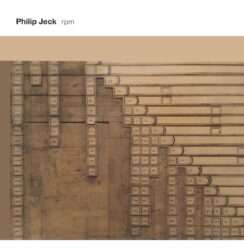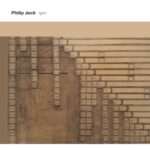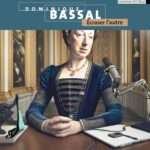PHILIP JECK – RPM
Philip Jeck, who passed away in 2022, will be remembered as the godfather of turntablism. He worked with old records and record players, playing them as musical instruments and thus creating a new kind of performance art. His ‘Vinyl Requiem’ (with Lol Sargent) used no less than 180 (!) record players – and won the Time Out Performance Award in 1993. He played and performed with many well-known artists such as Jah Wobble, Steve Lacy, Jaki Liebezeit, David Sylvian – and many, many more.
Touch, the label that released many of Jeck’s albums, now honors the artist with a 16-track double CD of his music in collaboration with an impressive array of artists: Fennesz, Gavin Bryars, Chris Watson, Rosy Parlane, Cris Cheek, Claire M Singer, Faith Coloccia, David Sylvian & Hildur Guðnadóttir, Jah Wobble & Deep Space, Drums Off Chaos, Chandra Shukla, and Jana Winderen.
RPM is not a collection of remixes of precious tracks, but a selection of music these artists worked on with Philip Jeck during the last years of Jeck’s life. It is an ode to the versatility and diversity of his music, including restless turntablist loops, calm ambient dronescapes, processed field recordings, dubby bass, and fierce rhythms. In working with so many different artists, Jeck proved himself a musical chameleon: each track is undeniably his, yet it unmistakably reflects the style of the artist he collaborates with.
By ‘joining some of the dots of Philip’s life and involving many other collaborators, early and more recent’, Touch created a monumental tribute to this unique artist.
DOMINIQUE BASSAL – ÉCRASER L’AUTRE
Dominique Bassal‘s new album is released on Empreintes Digitales, thé label specializing in electroacoustic-/acousmatic music and musique concrète since 1990. If you’re familiar with the label, you probably know what sort of sonic adventures to expect.
But Basset obviously wanted ‘to throw a cat amongst the pigeons’ with Écraser L’Autre (‘Crush The Other’), to shake up his fellow acousticians with provocative statements. There are quite a lot of those in the self-deprecating liner notes – some of which I will quote here:
“Acousmatic music exists only as the prisoner of an unsympathetic, exclusivist, and ascetic convention.[…] Shielded as I am by acousmatics’ total lack of exposure, I can allow myself to disobey any and all rules. So here’s my “process”: we still sound pretty bad. And why is that? Because acousmatic music is foremost the victim of a geek complex both deeply ingrained and highly paradoxical: the absolute rejection of emotional musical content, of an understandable narrative arc, of any compromise in terms of predictability.” […] Our avant-garde esthetics do not automatically turn sound materials into something listenable, let alone enjoyable.”
He then continues to rub some extra salt in the wound by stating that acousmatic composers wrongfully ignore (or avoid with disdain) the technical skills of commercial producers and the new tools being developed in other genres.
“And yet, some of those techniques are based on serious analytical research, for instance on treating potential conflicts — or unexpected collisions — between sound materials themselves and the human ear. And those techniques (often) work. […] A quick survey of the big names of acousmatic music shows that no one in the “community” has exhibited a fraction of the creative genius required to compete with the massive knowledge and techniques collectively gathered by pop music producers in recent decades.”
Ouch!
Does this mean that Bassal’s music on Écraser L’Autre sounds different – more pop-oriented perhaps – from other releases on Empreintes Digitales?
Not really, if you ask me – these fascinating soundscapes still perfectly fit the label. At times, parts may be more accessible than some of the more hardcore acousmatic music. And maybe Bassal used some of the ‘commercial’ producer’s techniques to achieve his results. As he says himself: “I’m not pretending I’ve gotten there yet, but it’s a fair step in the right direction…”
In any case, this is not only a fun read (full text on the Bandcamp page), but it’s also a fun listen – especially if you can appreciate these kinds of wild-ride, abstract compositions created from amazing sounds.
Note: Bandcamp only hosts the digital download version. A CD-R version can be obtained here.




